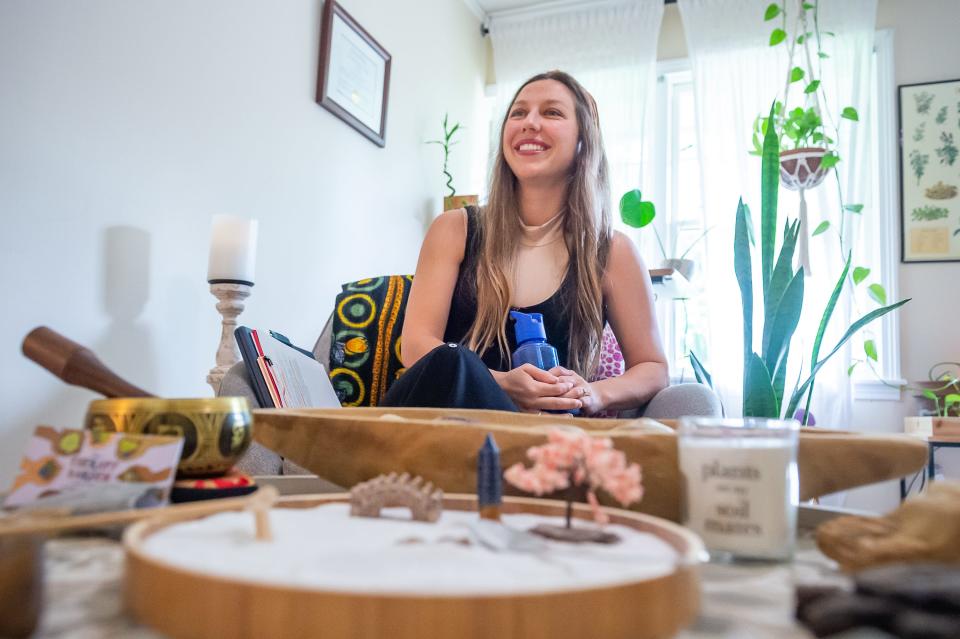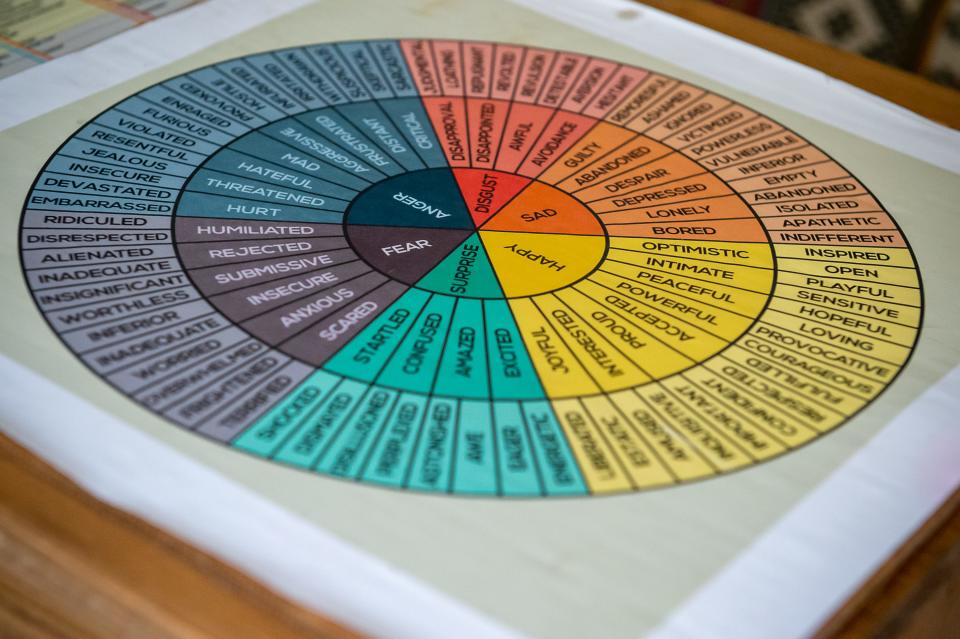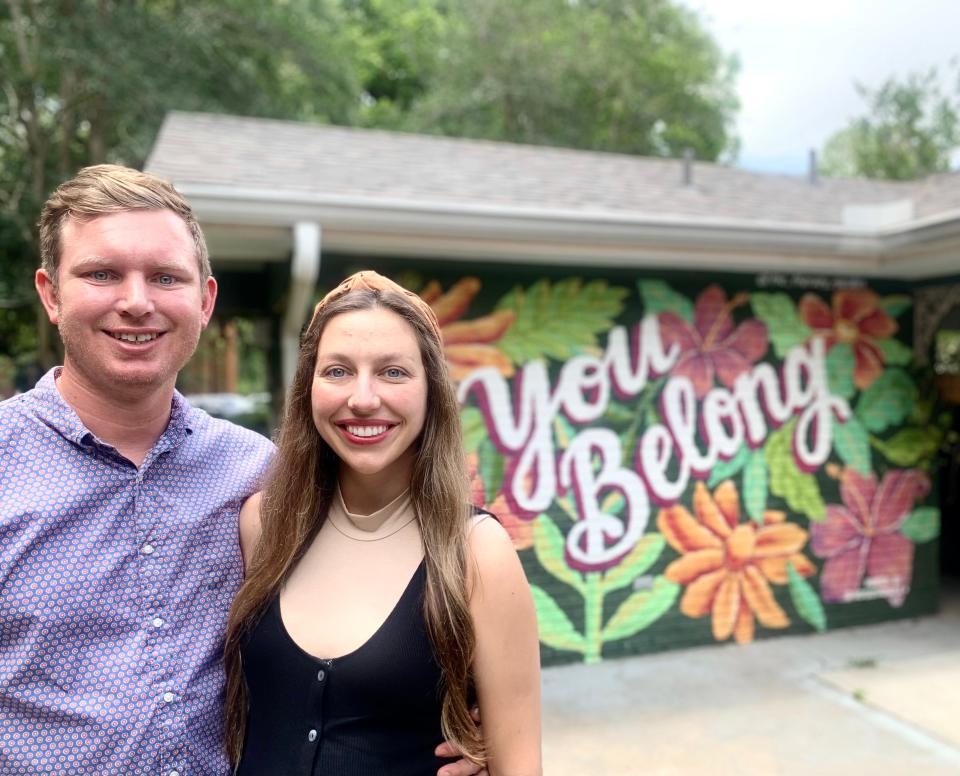Mental health experts call for early intervention, discussion as youth suicide risk rises
Arlana Miller was 19, a college cheerleader days away from completing her freshman year at Southern University in Baton Rouge when she died by suicide May 4.
She struggled with thoughts of suicide since her early teenage years, she wrote in a goodbye note on Instagram. In the post that has since been removed, Miller wrote that she hadn't "been OK for a while" and that just this year she struggled with academics, the pandemic and tearing her ACL.
The freshman was far from alone in such struggles. Suicide is a leading cause of death among college and university students in the United States, with 20 young people dying by suicide every day, according to the National Alliance for Mental Illness.
The COVID-19 pandemic and economic recession only added to the stress, anxiety and depression many already were experiencing.
Over the pandemic, about four in 10 adults in the U.S. have reported symptoms of anxiety or depressive disorder, up from one in 10 adults who reported these symptoms from January to June 2019, according to the Kaiser Family Foundation.

Emergency department visits for suspected suicide attempts in February and March 2021 were 51% higher among adolescent girls (age 12–17) compared to the same time in 2019.
In June 2020, 74.9% of people aged 18–24 reported at least one mental health or substance use concern. Eight in 10 (83%) college students reported feelings of significant anxiety or stress after the start of the fall 2021 semester, according to the National Alliance for Mental Illness.
Sadly, though, the problem is even more widespread. Suicide risk for kids as young as 8 has risen sharply over the last 10 years.
As such statistics increase, so does the importance of early intervention.
Nearly 50% of all lifetime mental illnesses start by age 14, and 75% by age 24, and the average time between onset of symptoms and when someone receives treatment is 11 years, according to NAMI.
"An entire childhood or adolescence could be robbed in that amount of time," reads a NAMI report. "The earlier we catch the signs and symptoms of mental health conditions, the more we can improve the quality of life for young people and witness better outcomes."
Kathryn Dietzway, psychotherapist and clinical director of The Therapy Garden in Lafayette, saw the rising risk of suicide in young students while working in and around New Orleans as a school social worker.
"I was having so many suicide risk assessments at the elementary level that I was looking for resources and found nothing," she said. "It was a problem."
'A perfect storm': College students face incredible mental health stressors amid pandemic
The evidence-based research and resources she did find focused on teenagers, which isn't a great fit for younger kids.
Dietzway reached out to Mercy Family Center, an outpatient behavioral health clinic for adolescents and their families in New Orleans, to fill that void. Through Project Fleur-de-lis they created a Therapeutic Suicide Risk Assessment and Safety Planning in Young Children training manual.
It includes warning signs, age-appropriate sample questions, a sample safety plan form and other forms, a threat assessment as well as appendices on bullying and working with parents.
How cognitive development fits into this
There are several aspects that make youth a critical age. The brain is not fully developed until age 25, Dietzway points out, so children, teens and young adults have not acquired the cognitive skills needed to fully process the world around them.
"I look at suicide among young people through the lens of cognitive development as well as society," she said.
According to cognitive development, most children don't develop abstract logic and the potential for mature, moral reasoning until age 12 or higher.

Humans continually try to answer the question "Who am I?", a process that expresses itself differently by age group. Little children ask the question in relation to their parents or family. Adolescents try to find the answer in relation to their peers or perceived social circle, which is wider than ever before with social media.
"They look to the outside world to see where do I belong, who am I," Dietzway said.
Danger comes in when the social circle — in-person or virtual — that defines them is toxic. Social media can be a factor in this, with its carefully curated comparison culture.
Researchers have studied this phenomenon, defined as social media pitting users against each other by urging them to repeatedly compare themselves to less-than-authentic versions of each other, and found it is having a negative impact on people's self-esteem.
"Twenty-five or older is when our brains are fully developed and we can see something and say, 'OK, that hurts, but it doesn't define me,'" Dietzway said. "You don't have that ability as a teenager. They don't have the brain development to critically assess the messages they're seeing on social media."
It's a skill that can be taught, but it doesn't come naturally until later in life.
The understanding of time is the last cognitive skill to develop, which explains why time seems to move so slowly when you're a child and fly as an adult, she explained. That skill also includes the executive functioning to plan for the future and to understand that this too shall pass.
"At this age, when time seems so long, pain seems worse or hopeless," she said. "If you have a sense of hopelessness with your pain that is a suicide risk."
With this sense of time, "good" experiences like drinking all night also feel like they'll last longer. Paired with the fact that people don't develop impulse control until in their mid- to late 20s, this can increase involvement in risky behavior and possibly contribute to the increased risk of suicide and mental health struggles.
Another vulnerability for teens and children is in not being able to seek help on their own.
"Some children don't know how to truly express themselves," NAMI Louisiana Executive Director LaShonda Williams said.
And juveniles need a guardian to schedule therapy and likely to provide transportation.
'We want people to talk'
Tatiana Gonzalez Quiroga, advocacy and state program director for NAMI Louisiana, called the rising levels of mental health concerns "really alarming."
She believes a major factor behind the rise is people aren't talking about the issue enough. Many still consider mental health a taboo topic, especially within minority communities, she said.
"We want people to talk," Gonzalez said. "That's why we're doing programs like Sharing Hope."
Sharing Hope is a three-part series that explores mental wellness in communities of color through dialogue, storytelling and guided discussion.
Williams has been presenting the series at LSU and other colleges, as Gonzalez presents the series in Spanish as Compartiendo Esperanza.
A large part of NAMI's mission is to eradicate stigma, Williams said.

"Many people suffer from mental illness, but we want them to not be ashamed," Williams said. "We are here to bring awareness and educate people on how to recognize symptoms."
NAMI Louisiana is trying to reach young people through college presentations like Sharing Hope as well as training youth advocates with Ending the Silence. There also are NAMI chapters at universities around the state.
"We really want to target our youth," Gonzalez said. "They are the most vulnerable. It's the most stressed out of all generations."
What can we do?
Talking it through normalizes taking care of mental health, and Dietzway said those conversations should start early.
Addressing the shortage: Psychiatric mental health program aims to meet growing need for specialized professionals
Parents can begin these tough talks when their children are very young, using age-appropriate language. She suggests that parents talk about what works for them when they have feelings of worry or sadness, for example.
But most importantly, she said, adults should listen.
"We often try to project our side or our feelings on them," the psychotherapist said. "They really need space to be heard."
This often happens when dealing with teenagers and young adults, she said, because they look older.
"We really need to stop projecting our adult minds on teenagers and young adults who aren't cognitively fully grown," she said. "They might look older and still need our help, our support and our understanding."

As more families have these conversations, she sees a perspective shift gradually taking place — seeing mental health as physical health.
"We need to let go of those myths, like if we just ignore it, it'll go away," she said. "We don't ignore a broken leg. And if we do it just gets worse."
She also cautioned against waiting too long to seek help.
"A lot of people wait until it's a crisis for their kids," Dietzway said. "Get them into care before it's a crisis, and then when it is, take it seriously."
She recommends going to a psychiatric inpatient facility if possible, because the person doing the intake is equipped to do the risk assessment. The Emergency Room also is an option.
To contact the National Suicide Prevention Lifeline call 800-273-8255.
Teens in Louisiana can text 833-TXT-TEEN (833-898-8336) to reach the VIA LINK's Teen Crisis Textline. It was created to support youth in emotional distress or who just want to talk to someone and is primarily meant to serve youth ages 13-22 throughout the state.
Contact children's issues reporter Leigh Guidry at Lguidry@theadvertiser.com or on Twitter @LeighGGuidry.
This article originally appeared on Lafayette Daily Advertiser: More young people are dying by suicide; mental health experts weigh in

